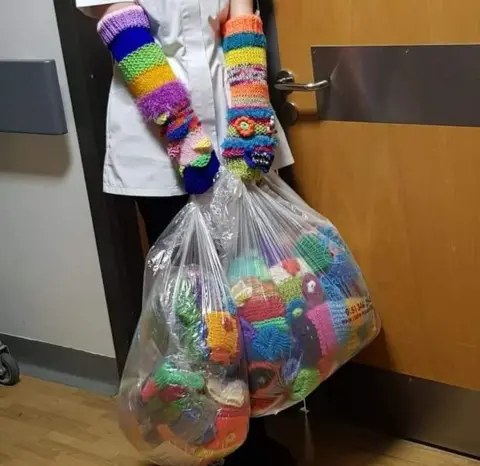Cannula sleeves: 'Simple solution for dementia patients'
 HandmadeForDementia
HandmadeForDementiaWhen singer Sharon Wallace volunteered at a hospice in her local area, she noticed how small things can make a huge difference.
"It can be heartbreaking when you see people affected by dementia," she said. "They're often in another world, but music can really help," she told the BBC.
She also noticed how some of the residents with dementia could be quite fidgety.
"So when I saw a 'twiddle mitt' - a knitted cuff with ribbons, buttons or beads attached - I thought I'd like to make some," Sharon said.
In 2016 she combined her passion to help and to knit and started a knitting group which held meetings in Chester every Monday. It became so successful, she set up a Facebook group 'Handmade for Dementia' to enable more people to join in from different areas and share their ideas.
The mitts were sent to local hospitals and hospices, until they reached saturation point. Then in 2018 fellow knitter, and retired nurse, Eileen Copeland suggested making "cannula sleeves".
 Sharon Wallace
Sharon WallaceThey reach further up the arm than the original mitt covering the entry point of the intravenous tube, and are adorned with crocheted decorations rather than beads and buttons which could be a choking hazard.
"From then on my life changed completely," said Sharon, who also coordinates knitters from all over who make many contributions.
Allow X content?

The group now has secured copyright for their patterns, each creation is risk assessed - to prevent hazards such as choking - and they've made more than 6,000 between them.
As Dementia Action Week, organised by the Alzheimer's Society, runs from 20 to 26 May, Sharon hopes more people will find out about the group, which relies on donations to fund the sleeves.
The Countess of Chester Hospital, which has received 1,000 donations from the group, says the products created by Handmade for Dementia are "much needed stimulus for those patients affected by dementia. They're quality tested and safe to use."
At Arrowe Park Hospital, part of Wirral Hospital, Matron Helen Morris said the sleeves are a "simple solution that can help so many".
Emergency medicine trainee Yvette Ruddock said the sleeves have been amazing, since she managed to apply a cannula to a patient she thought would need sedation.
Allow X content?

The group has gained some attention since winning 'Trailblazer of the Year' at the Dementia Friendly Awards in 2018.
Allow X content?

As well as being a creative and social space, Sharon says people are joining the group to help alleviate stress and cope with other issues.
Student Gabby Walker, was taught to knit and crochet by her mother and grandmother, and wanted a hobby to give her a break from screens.
When she joined the group she learned more about dementia and heard stories about the positive impact the sleeves were having across the country.
So far, there are no men in the Handmade for Dementia group, but Sharon welcomes anyone to join - as long as they can knit.
She is keen to spread the word: "Knitting helps people help others. We're all doing our bit."
